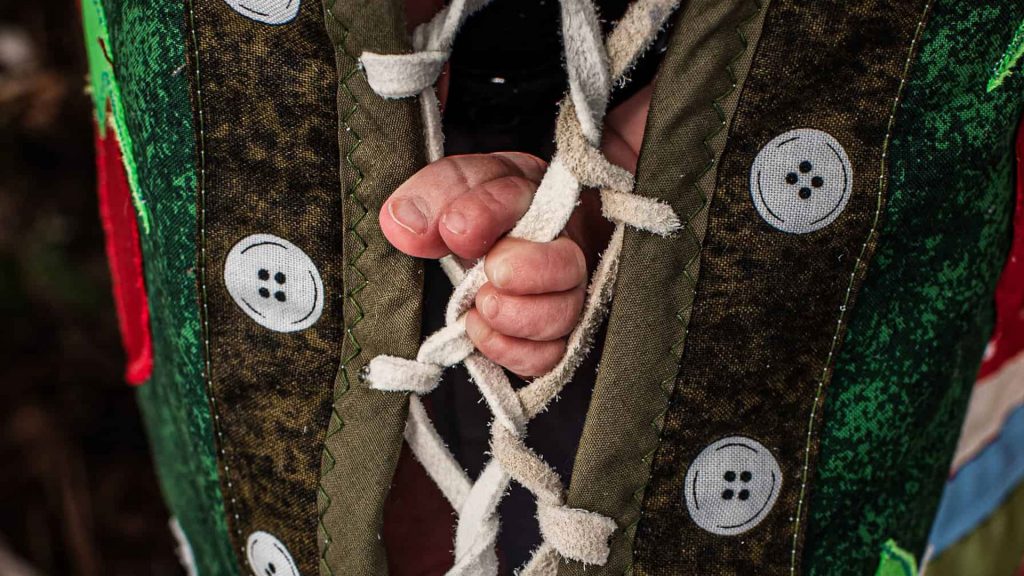
Indigenous families are disproportionately impacted by birth alerts. Photo: APTN file
This story contains information about birth alerts that may be triggering. It’s part of a series about the legality of #BirthAlerts and the implications for families.
Parents who were subjected to a birth alert in B.C. are being represented in a proposed class action filed in B.C.’s Supreme Court on Wednesday.
A “birth alert” is when a social worker flags a pregnant person to hospital staff without their consent, requiring hospital staff to contact child protection authorities once the baby’s born.
These alerts sometimes lead to a newborn being apprehended or removed from their mother. In B.C., birth alerts resulted in apprehensions “approximately 28% of the time,” according to records obtained by IndigiNews.
Birth alerts are “issued based on speculative child protection concerns, often without any supporting evidence,” alleges the statement of claim filed by Camp Fiorante Matthews Mogerman LLP (CFM), a Vancouver-based firm.
These alerts are “grounded in discriminatory assumptions regarding which individuals are likely to be neglectful or abusive parents,” and they are “disproportionately employed against Indigenous, racialized, and/or disabled pregnant persons,” the claim alleges.
In 2019, the National Inquiry into Missing and Murdered Indigenous Women and Girls called attention to the impact of these alerts on Indigenous women in its final report.
“Birth alerts are racist and discriminatory and are a gross violation of the rights of the child, the mother, and the community,” the inquiry found.
In this class action against “Her Majesty the Queen in Right of the Province of British Columbia, by the Ministry of Children and Family Development,” CFM is alleging that birth alerts are “a product of the state’s colonialist and paternalistic attitude.”
The impact of a birth alert is ‘lifelong’
Nikida Steel is the proposed representative plaintiff in this class action.
“Being subject to birth alerts during each of her pregnancies made her feel ‘betrayed and disgusted,’” according to a statement released by CFM this afternoon.
“Calling out the government for what it did can help to remove the stigma and shame from other people who have experienced this. I want to try to hold the government accountable, and to prevent this type of reprehensible behaviour in the future,” says Steel.
Many provinces and territories, including B.C., formally stopped issuing birth alerts in recent years, but that doesn’t mean they don’t continue to impact those who’ve experienced them.
“It is something that follows you lifelong,” says Steel. “The fact that a birth alert was issued about you continues to affect your dealing with the system forever.”
CFM says it is bringing this case “on behalf of all persons who were, while pregnant, the subject of a birth alert issued in British Columbia, including a subclass of all Indigenous, racialized, and/or disabled class members.”
The firm is inviting potential class members to register at [email protected] and to contact Jen Winstanley, a partner at CFM, for more information: 604-331-9539 or [email protected].
Winstanley encourages anyone who suspects they were subject to a birth alert to get in touch, even if they aren’t sure.
There were at least 444 birth alerts issued in B.C. between Jan. 1, 2018 and Aug. 31, 2019, according to data from the Ministry of Children and Family Development (MCFD).
Fifty-eight per cent of parents impacted by birth alerts in 2018 were Indigenous.
But many of these parents may not know they’ve been subject to birth alerts because, as reported by IndigiNews, the ministry hasn’t told them.
“Our focus since we ended the practice of birth alerts has been forward looking. We didn’t want to retraumatize affected families by providing notifications of past birth alerts,” wrote a spokesperson to IndigiNews. “Our goal was to ensure the safety of children by ensuring the family had the supports they needed to keep kids safe.”
Winstanley advises parents who aren’t sure whether they’ve been subject to a birth alert to request a copy of their health records from the B.C. government.
“That’s how our representative plaintiff was able to confirm that she has been subject to a birth alert,” she says, adding that CFM can help people file for their records.
Part of a ‘national litigation effort’
This proposed class action still needs to be certified by the courts, and this process can take years, says Winstanley.
Timelines are impacted by a number of factors including “court and counsel availability,” she says. “This one might be a little bit quicker because we have one defendant and it’s provincial (and not national).”
CFM is working with a group of law firms across the country that plans to file “additional provincial class proceedings,” according to CFM’s press release.
The firm started “actively investigating and structuring a national litigation plan” earlier this year, after an IndigiNews investigation revealed records showing that B.C.’s Attorney General sent a memo to MCFD confirming that birth alerts are “illegal and unconstitutional.”
This revelation makes this case, “a little bit unique,” says Winstanley. “Because we’re dealing with admittedly wrongful contact.”
Since beginning their investigation, Winstanley says the team at CFM has “confirmed that the process was widespread up until it was discontinued.” They’ve also “spoken to a few women that have been the subject of birth alerts.”
“[We are] making sure everything is very voluntary and confidential and not putting any pressure on people to come forward,” Winstanley says.
She says her firm will help anyone who comes forward to connect with culturally-appropriate resources, as needed. To ensure their process is trauma-informed, she says she’s having “extensive discussions” with Alisa Lombard, a partner at the Indigenous-owned and operated firm Semanganis Worme Lombard (SWL).
SWL is working with CFM on this case, and Lombard is also working on a class action to address the forced sterilization of Indigenous women in Canada.
“We feel this is the type of case that calls out for a real resolution,” says Winstanley. “And we’re really hopeful that it’s not going to lead to many years of contested litigation, and sort of, a denial.”
IndigiNews is committed to trauma-informed reporting, which involves taking time and care, transparency and creating safety plans for those who come forward with stories to share. Brielle Morgan is a white journalist living on the unceded territory of the xʷməθkwəy̓əm (Musqueam), Skwxwú7mesh (Squamish), and Səl̓ílwətaɬ (Tsleil-Waututh) Nations. She strives to work in solidarity with her Indigenous colleagues and uphold trauma-informed practices. See examples of her past reporting on the child-welfare system here and here.










